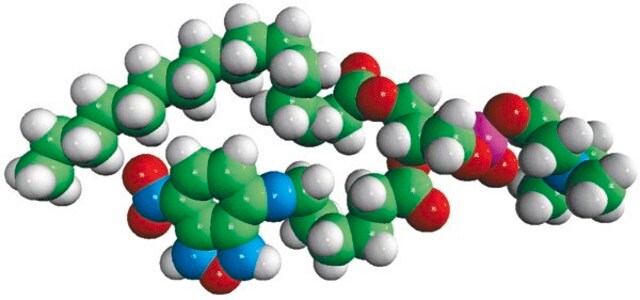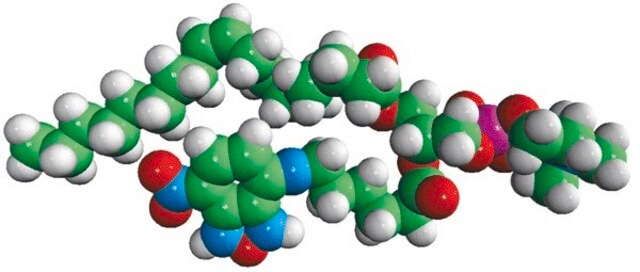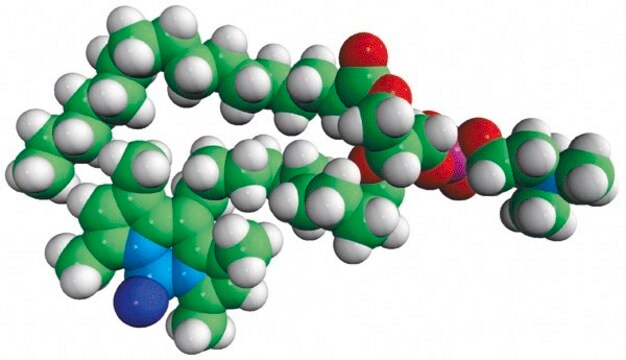810133P
Avanti
18:1-12:0 NBD PC
Avanti Research™ - A Croda Brand 810133P, powder
Synonym(s):
1-Oleoyl-2-[12-[(7-nitro-2-1,3-benzoxadiazol-4-yl)amino]dodecanoyl]-sn-Glycero-3-Phosphocholine
Sign Into View Organizational & Contract Pricing
All Photos(2)
About This Item
Empirical Formula (Hill Notation):
C44H76N5O11P
CAS Number:
Molecular Weight:
882.07
UNSPSC Code:
12352211
NACRES:
NA.25
Recommended Products
Assay
>99% (TLC)
form
powder
packaging
pkg of 1 × 1 mg (810133P-1mg)
pkg of 5 × 1 mg (810133P-5mg)
manufacturer/tradename
Avanti Research™ - A Croda Brand 810133P
shipped in
dry ice
storage temp.
−20°C
General description
Phosphocholine is considered as a precursor molecule. It is formed during the breakdown of phosphatidylcholine metabolism.
Application
18:1-12:0 NBD PC is suitable for use:
- as an optical probe of dynamics in the preparation of liposomes
- as the fluorophore in the formation of neuropathy target esterase (NTE) catalytic domain (NEST) proteoliposome
- as a component in bilayer membranes
- to prepare lipid vesicles
Packaging
5 mL Amber Glass Screw Cap Vial (810133P-1mg)
5 mL Amber Glass Screw Cap Vial (810133P-5mg)
Legal Information
Avanti Research is a trademark of Avanti Polar Lipids, LLC
Storage Class Code
11 - Combustible Solids
Certificates of Analysis (COA)
Search for Certificates of Analysis (COA) by entering the products Lot/Batch Number. Lot and Batch Numbers can be found on a product’s label following the words ‘Lot’ or ‘Batch’.
Already Own This Product?
Find documentation for the products that you have recently purchased in the Document Library.
Influence of lysophospholipid hydrolysis by the catalytic domain of neuropathy target esterase on the fluidity of bilayer lipid membranes
Greiner AJ, et al.
Biochimica et Biophysica Acta - Biomembranes, 1798(8), 1533-1539 (2010)
Antimicrobial peptides temporins B and L induce formation of tubular lipid protrusions from supported phospholipid bilayers
Domanov YA and Kinnunen PKJ
Biophysical Journal, 91(12), 4427-4439 (2006)
Biology-cancer metabolic phenotype
NMR Metabolomics in Cancer Research, 15-138 (2013)
Comparison of liposomes formed by sonication and extrusion: rotational and translational diffusion of an embedded chromophore
Lapinski MM, et al.
Langmuir, 23(23), 11677-11683 (2007)
Haijia Yu et al.
Proceedings of the National Academy of Sciences of the United States of America, 113(16), 4362-4367 (2016-04-05)
Organelles are in constant communication with each other through exchange of proteins (mediated by trafficking vesicles) and lipids [mediated by both trafficking vesicles and lipid transfer proteins (LTPs)]. It has long been known that vesicle trafficking can be tightly regulated
Our team of scientists has experience in all areas of research including Life Science, Material Science, Chemical Synthesis, Chromatography, Analytical and many others.
Contact Technical Service








